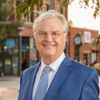| “
|
The Omaha that we love is beautiful and diverse. We’re hardworking, everyday people who want to make it better. We have solutions.
We need a leader who will listen.
Improve public safety
The best way to keep our communities safe is to invest in solutions that address the reasons people come into contact with the criminal justice system in the first place. We need to prioritize working on the root cases, such as mental health, poverty, and inequitable access to resources.
By prioritizing these services and addressing patterns of police violence and misconduct, we can reimagine a new community policing model.
- Restore the public's trust.
- In order to restore trust in our community’s law enforcement, we have to increase the transparency and accountability of police data and practices. As Mayor, I’ll ensure we join the Lincoln Police Department and over 120 other police departments across the nation in the police data initiative.
- Reinstate the police auditor position and restructure our community oversight board to include investigative powers and authority. There's insufficient evidence to show that increased police surveillance results in fewer crimes and greater public safety.
- Require a special prosecutor to process cases of alleged police misconduct.
- Prioritize an approach to public safety that’s about prevention and not criminalization.
- Within our first year we will create a pilot network of community-run violence-prevention programs in partnership with law enforcement, rooted in evidence-based practices that have seen success in communities like ours.
- Focus on preventing people from coming into contact with the justice system. Scale back over-policing, especially for minor ‘broken-windows’ offenses that criminalize communities of color especially.
- Programs will include collaborating with a network of existing and new mobile crisis services, peer crisis services, neighborhood-based safety centers, and crisis hotlines and warmlines.
- Introduce a transparent process for police accountability.
- Work with local law enforcement to create a three strike program for officer misconduct to increase transparency and public accountability necessary to take community trust in our local law enforcement.
- Safer outcomes with demilitarized local officers.
- Demilitarize our local police, making their jobs and our communities safer.
- Recommit to trauma-informed de-escalation trainings.
Help Omaha heal from COVID-19
Omaha needs a proactive response to COVID-19. It is imperative that we listen to our health professionals and create citywide plans that allow us to maximize vaccine distribution, help small businesses survive, and keep our residents safe until we can fully manage the virus.
I studied alongside some of the world-renowned public health experts leading the fight against COVID-19. Because of that experience I know that in order for our community to recover, we must finally flatten the curve, advocate for vaccinations for essential workers and vulnerable Omahans, and work on healing the trauma caused by COVID-19 to our community.
Our city leadership failed us when the pandemic began, by not letting our world-renowned public health leaders direct us. As your Mayor, I promise to build a coalition to ensure that does not happen again.
- Reimagine proximity, contact and accessibility in public spaces
- As Mayor I will help our city reimagine what proximity and contact looks like in public spaces - from restaurants to public parks to City Hall.
- Flatten the curve of COVID-19 and get Omaha back to work.
- As Mayor, I’ll work with Douglas County Health Department to continue to monitor exposure rates through continued testing, expand our contact tracing and reporting practices, and closely monitor and report any COVID-19 variants within the state
- Prioritize equitable distribution of the COVID-19 vaccine to address access by removing barriers due to online registration, transportation, appointment availability and wait time.
- Coordinate an expansive communications strategy that shares accurate, culturally competent information about the pandemic and the vaccine for informed decision making to increase vaccination rates
- Essential workers should be treated like they’re essential. I plan to establish a community network designed specifically to connect essential workers to essential services, from health care, to healthy food & food assistance, to accessible transit, etc.
- Healing the trauma of the pandemic on families and businesses in every neighborhood.
- Facilitate equitable distribution of CARES Act Funding received by the city of Omaha for rent and utilities assistance, food supplies and small business support
- Reanalyze our commitment to healthy neighborhoods
- Work with our communications department, Douglas County Health Department, and other community stakeholders to create communication and education awareness around the COVID-19 virus, vaccine and other health and wellness challenges impacting our families.
- Recommit to addressing systemic health disparities affecting our families.
- Collaborate with community leaders, advocates and activists in our Black, Indigenous, and other people of color (BIPOC) communities to increase communication for informed decision making and dispel mistrust around the historical mistreatment by medical/healthcare systems
- Reorient our emergency response plan
- As Mayor, I’ll build a coalition with the Douglas County Emergency Management Agency, Douglas County Health Department and UNMC College of Public Health, along with other community stakeholders and subject matter experts to update our Local Emergency Operations Plans. It’s time to assess our strategies and implement innovative best practices for emergency preparedness, including lessons learned from the COVID-19 pandemic that communities like Omaha across the country have implemented for future response and recovery.
Innovative + sustainable infrastructure
We deserve a timely and innovative approach to modernizing Omaha’s gray, green and blue infrastructure. There are elements of our city’s master plan that hasn’t been updated to the public since Mike Fahey & Jim Suttle’s time in office. The challenges of our city are constantly evolving and we have to evolve with it; it should not take our leadership eight years to create an urgent community need, like a climate action plan or a mobile application.
It’s past time for Omaha to provide reliable, equitable transit, modern city services with equitable accessibility, and an active commitment to sustainability that reduces and offsets Omaha’s carbon footprint. We are also in desperate need of simple, innovative ways for residents to talk with City leaders. Omaha citizens will have access to every single department, and provide feedback and input on how their programs and projects are affecting families in every neighborhood. I will always prioritize you, and make it easy for you to get in touch with me.
- City services that make sense.
- We’ve had generations of mayors who make promises to “fix our trash”. I will work with the local experts in our community to actually build a waste management solution that will resolve our city’s complex needs - that includes community composting, a diversity of recycling solutions that can meet the demand of our community, and reliable, equitable waste collection that minimizes our carbon footprint.
- 21st Century transportation.
- We need to connect our community; we’ve missed out on key transportation initiatives that could have enabled us to thrive in the same ways as our major competitors. Right now, people in our community can’t get from one side of the city to another, let alone to other areas throughout the region without access to a car. I’ll work with MAPA and other regional transportation advocates and stakeholders to ensure we have a plan to bring our transportation infrastructure into the 21st Century, advocating for the creation of a light rail to connect regional transportation.
- We’ll expand the bikeability of our community and increase the offerings of scooters and other transportation offerings across Omaha.
- We’ll increase the walkability of every neighborhood in our city, by making sure every single neighborhood has accessible sidewalks, curbs and gutters. Neighborhoods in our urban core, especially those built after World War II, are still lacking these basic necessities.
- We’ll provide transparent access for our community to the Community Improvement Plan, allowing Omaha to provide direct feedback and input on the plan that directly impacts them and their neighborhoods.
- As your Mayor, I will invite community advocates and stakeholders to the Vision Zero planning team, so we can have a more equitable and inclusive lens that reflects the diversity of the city and its needs.
- Accessible energy solutions
- Communities large and small are creating innovative solutions to our energy needs. Omaha once had a nuclear plant that was able to supplement the needs of our local community’s electric demands. Hastings has a solar energy park that helps power its community. And residents want to find accessible, affordable ways for our city and its citizens to participate in renewable energy that diminishes our reliance on fossil fuels.
- Keep our community connected.
- Starting Day 1, I will meet with the heads of every single department in our city government, about how we can work together on including you in our plan to solve our community’s challenges. I will ask each department head to make a commitment to meaningful transparency with the people of our community.
- We need to be offering accessible opportunities for our community to engage in civic processes so they can make their voices heard and concerns are taken seriously, addressing barriers like City Council hearing times, innovation hub, community feedback that’s reflective of the availability of the community, transparent communication. Public WIFI & a commitment to a smart cities initiative.
- Commitment to efficiency.
- Add a department focused on innovation and efficiency, hiring a Director of Innovation and an efficiency team that works with all city departments on improving the data collection, efficiency and efficacy of our work.
- Environmental accountability
- As Mayor, I’ll ensure that all city buildings adopt sustainability action plans for reducing our current energy footprint and working with local sustainability experts to implement renewable energy systems in community spaces directly under our supervision. I commit to reducing City Hall's carbon footprint by 21% by the end of my first year in office, and promoting key changes that include:
- 1. Plastic bag ban: The City Council passed a plastic bag ban last year that was vetoed by our current Mayor. When I am elected, I will work with the City Council to ensure the passage and implementation of the ban.
- 2. Renewable energy: Creating a pilot program with city structures that enables us to test implementing renewable energy resources in city government buildings.
Economic recovery + resiliency
With the loss or significant change in the local commitment of major corporate businesses that were key investments, like TD Ameritrade, Conagra, and Union Pacific, our city has struggled on how to balance its budget accordingly. The taxpayers have had to pick up the bill, with incremental increases in property and infrastructure taxes, and when COVID-19 hit our local economy suffered. Small businesses shuttered, tourism stopped, and key revenue opportunities have been put on pause which has lasted for almost exactly a year. Our leadership played politics rather than following the guidance of the world-renowned specialists in our own community, and it has cost our community our once thriving local economy. Omaha needs a mayor that can guide our community with a prudent, innovative and equitable approach to our city’s economic recovery. We have to build a plan that strengthens our resiliency in times of challenges, so that we come out even stronger and better than before.
- Actively empower small + local businesses.
- Support, amplify and empower our existing entrepreneurship programs and encourage collaboration between them, to help provide a holistic network of support for aspiring entrepreneurs in every industry.
- Streamlining of small business support and access to things like contracts, permit applications, and pertinent information in one user-friendly portal
- Phased deployment of a living wage.
- Since the early 1990s, more than 120 cities and counties across the country have passed living-wage ordinances, which set wage standards for city employees, government contractors, and companies receiving public subsidies, to ensure that public spending creates good family-supporting jobs. Living-wage rates vary from city to city based on the local cost of living and political context; most range from about $9 to $16 per hour.
- Support ethical applications of collective bargaining.
- I fully support unions negotiating for fair and equitable working conditions, wages, and benefits for their members when that process is used equitably and fairly.
- Reimagine our collective approach to workforce development.
- I’ll expand our current workforce development opportunities and pilot a new program within the city that’s reimagining apprenticeships & fellowships - giving candidates with the transferable skills necessary to do entry- and mid-level positions the opportunity to gain work experience to overcome the barriers of education often listed as a prohibitive but unnecessary requirement to perform the work of essential jobs.
- Local and targeted hiring policies require or incentivize businesses that receive public resources, such as government contracts or tax breaks, to hire workers living in a particular geographic area or from specific populations within the community. This is usually done by revising employers’ hiring procedures to build in connections with referral sources that can promptly send qualified local and targeted workers in response to employer requests.
- Fair Chance Hiring
- Many employment applications ask job applicants to check a box to indicate if they have a criminal record. Fair Chance Hiring policies prohibit this practice, so employers look at a job candidate’s qualifications first, and only ask about criminal history later in the process, if necessary. These policies can eliminate one of the many barriers to economic security faced by people with criminal records.
Retain our Next Generation
Omaha must become a city that values the input and progression of its young people. Our young people and young professionals will step into leadership roles as our city population continues to age and we must prepare and empower them to be a part of the solutions that will create an Omaha of the future.
In order to encourage young Omahans to stay in Omaha, we must begin to address the reasons why they feel they have to leave. Having a feeling of connection to Omaha through its people, places and culture and addressing the same underlying issues that impact the rest of the community, like affordable housing, employment opportunities, and transportation around the city, are integral when coming up with ideas to keep our young people in Omaha.
The city government must lead by example and become more involved in setting the tone for how we plan to work with young people and young professionals to engage them in how Omaha will look and function in the future. This will be achieved through:
- Increase connectivity and direct opportunities for civic participation.
- Active involvement in creating an equitable and inclusive culture in the city leading by example through partnerships with the Greater Omaha Chamber’s Commitment to Opportunity, Diversity and Equity (CODE) program, Douglas County Department of Health and other partners addressing race relations in Omaha
- Incorporation of the Mayor’s Millennial Advisory Committee and Youth Advisory Commission into the other Boards and Commissions so that young professionals are included in the developments of Greater Omaha and their perspectives guide the planning and sustainability of the city
- Expand entrepreneurship and business development opportunities.
- Increased collaboration with the Greater Omaha Chamber, Nebraska Department of Economic Development and other entrepreneur programs for access to resources for business start-ups
- Expansion of technical assistance for different business industries through Omaha’s extensive and experienced business executives and established programs
- Create an intentional and robust mentorship & community advancement program.
- Foster relationships for a young professionals mentorship program that focuses on identified fields of study and career interests with partners in the public, private and educational sectors
- Treat essential workers like they’re essential.
- Give essential workers - those that work in retail, food service, sanitation and other under-appreciated industries access to the services and support they need to survive and thrive. We’ll work with community partners to establish equitable workplace protections, and in City Hall, we’ll fight for a living wage, freedom from discrimination, expanded family and sick leave, preserve SNAP benefits, improve our transportation infrastructure and advocate for safe, affordable and accessible housing.
Safe + affordable homes in all zip codes
The United States is dealing with one of the worst housing crises since the Great Depression. We are shouldering the weight of this reality here in Omaha. According to the Omaha Community Foundation’s The Landscape Community Listening Report, homelessness is increasing, about 75% of people living at or below the federal poverty line live in substandard housing, and 43% of renters spend more than the recommended amount of income on housing costs.
Access to safe and affordable housing should not depend on a person’s zip code, income, race or gender. The quality and affordability of housing impacts access to education, jobs, healthy foods, overall well-being, and more. In order for Omaha to work for and benefit everyone, we must address the housing crisis by applying an equity lens with efforts through:
- Housing equity begins with better language and an increased diversity of housing options.
- 1. Establishing working definitions in use at the local government level for affordable, safe and quality housing to ensure all efforts are approached from an equity perspective and promote mixed-income housing.
- 2. Work with developers and community advocates to increase the priority of affordable middle income housing housing offerings.
- 3.Effective and efficient administration of the landlord registry and rental inspection program with adequate resources and funding
- Create a task force ready to provide active solutions for people experiencing homelessness.
- 1. Creation of a multi-faceted task force that will include housing and homelessness prevention advocates, impacted individuals, and service providers to develop Omaha's strategic plan to provide active solutions to our housing challenges of affordability, quality, quantity and to end homelessness through prevention and intervention
- 1. Revise our current zoning laws and restrictions to enable a more inclusive approach to the housing needs of Omahans experiencing homelessness.
- 2. Expand and encourage the availability and quantity of innovative approaches to emergency and transitional housing needs such as tiny homes, auxiliary dwelling units and multi-family units to address in-fill and availability in proximity to accessible transportation
- 3. Increase the quality of existing housing through the identification and remediation of safety and health hazards, design to improve connection and quality of life
- Addressing homelessness begins with decriminalizing it.
- Decriminalize homelessness by repealing the panhandling ordinance and work with community leaders to establish a Tenants Bill of Rights and increase accountability for inequitable and inhumane eviction policies.
- Improve access to homeownership.
- Improve access to homeownership especially among Black, Indigenous, and other people of color (BIPOC), low income residents and their families by advocating for the elimination of redlining tactics, through partnerships with organizations that focus on financial counseling and homebuyer education, and encouraging production of affordable starter homes.
Building equitable access to opportunity
We have to embrace the diversity of today to prepare for the Omaha of tomorrow. By 2050, the majority of Douglas County will be non-white people of color. People in every neighborhood are struggling, and are asking for nothing more than equitable access to opportunity.
- Conduct a comprehensive audit on city government’s diversity, equity and inclusion.
- We know that our city government has failed to be accessible to Omahans as a whole; we need an audit to understand where those gaps are, so that we can build action plans to fix them.
- Update the current advisory board structure - we’re a team, not a hierarchy.
- Our city’s advisory boards, especially those with members of impacted populations, are expected to speak on behalf of all of those who share those identities, rather than actually intentionally providing the community an opportunity to engage directly. Their ability to guide the work of the city is entirely reliant on the Mayor's whims, with little to no transparency from city government to the Mayor’s “advisors.” They are also hand-picked by the Mayor and her staff, and therefore often fall short of reflecting their diversity of perspectives and lived experiences necessary to reflect a reasonable sample of our community.
- As Mayor I will make sure that these boards are approached as teams, and immediately work to diversify each of these teams so that their membership is reflective of the community we have. I know that their guidance, expertise and community commitment are necessary for our community to thrive.
- Expand worker protections, filling in the gaps.
- Many employment applications ask job applicants to check a box to indicate if they have a criminal record. Fair Chance Hiring policies prohibit this practice, so employers look at a job candidate’s qualifications first, and only ask about criminal history later in the process, if necessary. These policies can eliminate one of the many barriers to economic security faced by people who’ve come in contact with the criminal justice system.
- Freedom from discrimination based on your identity or your immutable characteristics, specifically including LGBTQIA+ protections, BIPOC protections, disability protections.
- Advocate for our immigrant and refugee friends and neighbors.
- Omaha will become a sanctuary city. Already immigrants make up one-fifth of our community’s population growth; contributing to the vibrancy and success of Omaha.
- Structurally including accessibility.
- Our community is overwhelmingly inaccessible for those who are not able-bodied and neurotypical. I will make sure every single department prioritizes accessibility as we reimagine our public spaces, communication and transparency.
- In order to move forward together we have to reconcile our past.
- Our community has to fully acknowledge and take accountability for its racial history, and the impact it's made on BIPOC families. Racism has been declared a public health crisis by our Douglas County Health Department, and we’ve seen the impact it has on the health and safety of Black, indigenous and other people of color communities in Omaha and across our state and nation. We’ll work with our community leaders to develop a plan to build awareness of our racial past, the systemic challenges they embedded that hinder equitable access to opportunity, and work together with Omahans to reconcile.
As Mayor I will fight for equitable access, opportunity and inclusion for all Omahans:
Essential workers. Black and African American people. Trans men and women. Neuro-divergent people. System-impacted people. Youth. Healthcare workers. Gender nonconforming people. Small-business owners. Asian American people. Bus drivers. Bisexual people. Veterans. New parents. Two-spirited people. Pansexual people. People experiencing homelessness. Trades professionals. Immigrants and refugees. Native and Indigenous people. Religious people. Grandparents. Lesbian people. Janitors & sanitation professionals. Jewish people. Gender-fluid people. Teachers and educators. Elders and Senior Citizens. Atheists. Latinx and Hispanic American people. Gay people. Entrepreneurs. Spiritual people. Union members. Sex workers. Gender-less people. Differently-abled people. Working poor. Farmers. Nonbinary people.
And all under-represented identities, including those not listed above. No matter the identities you carry, you deserve to be represented equitably in our city’s leadership. I want to build a better Omaha with you, advocating for a city that’s accessible, equitable and adaptable.
[2]
|
”
|


 = candidate completed the Ballotpedia Candidate Connection survey.
= candidate completed the Ballotpedia Candidate Connection survey.





 = candidate completed the Ballotpedia Candidate Connection survey.
= candidate completed the Ballotpedia Candidate Connection survey.


 = candidate completed the Ballotpedia Candidate Connection survey.
= candidate completed the Ballotpedia Candidate Connection survey.






 = candidate completed the Ballotpedia Candidate Connection survey.
= candidate completed the Ballotpedia Candidate Connection survey.








